Office Manager Resume Examples & Writing Tips for 2025

Jul 18, 2024
|
12 min read
Position yourself as a real leader with a resume that turns heads.
Rated by 348 people
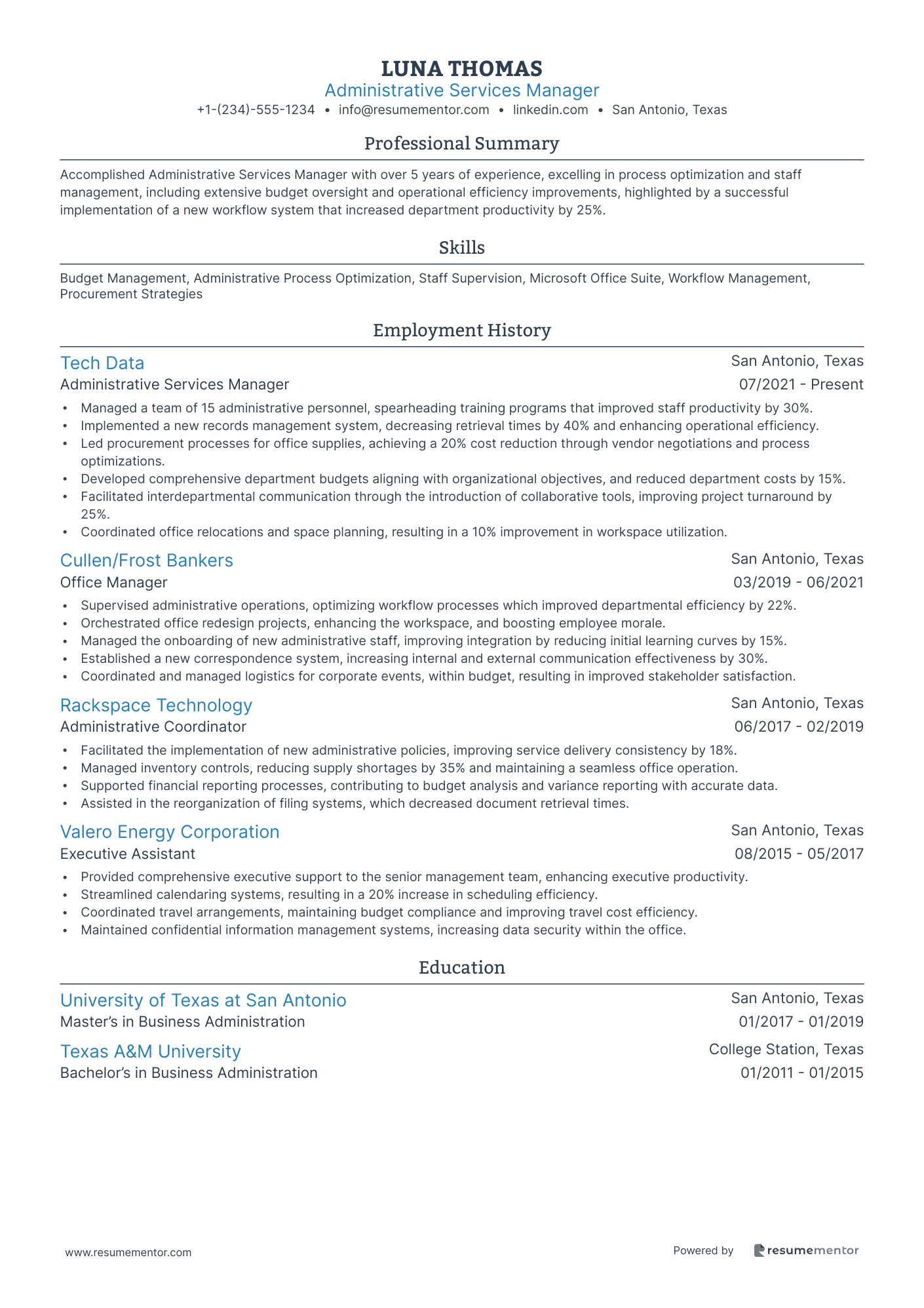
Administrative Services Manager
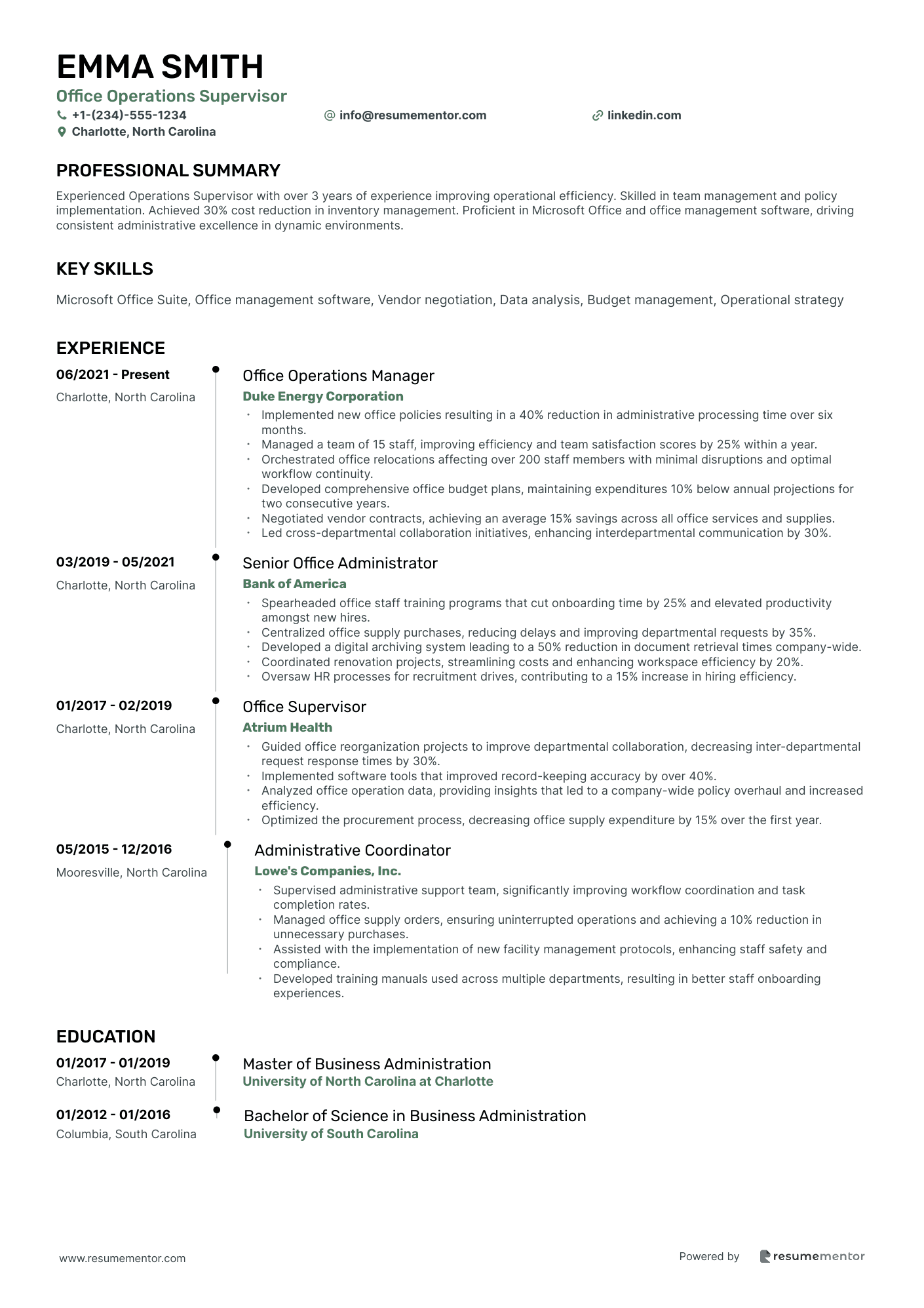
Office Operations Supervisor
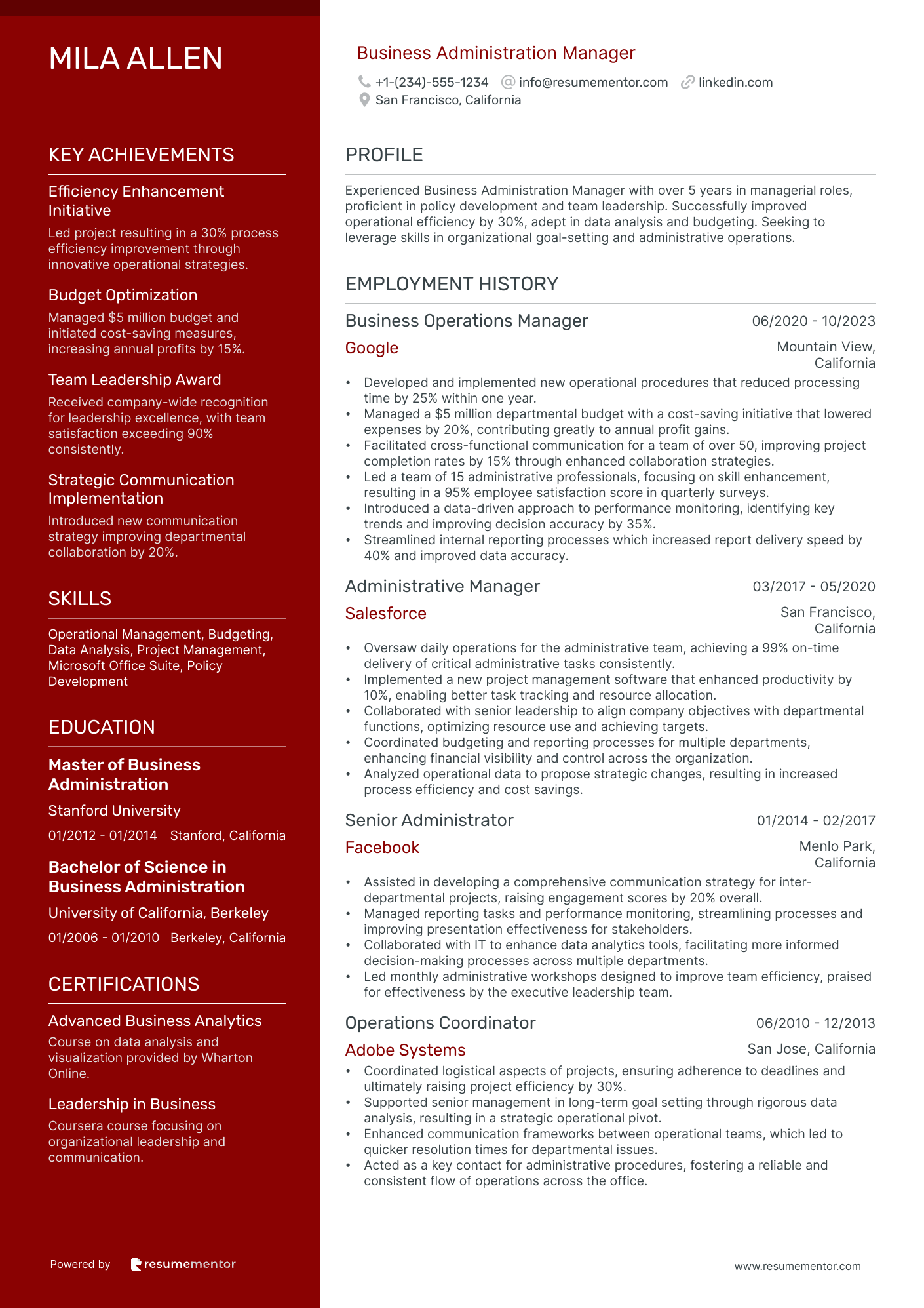
Business Administration Manager
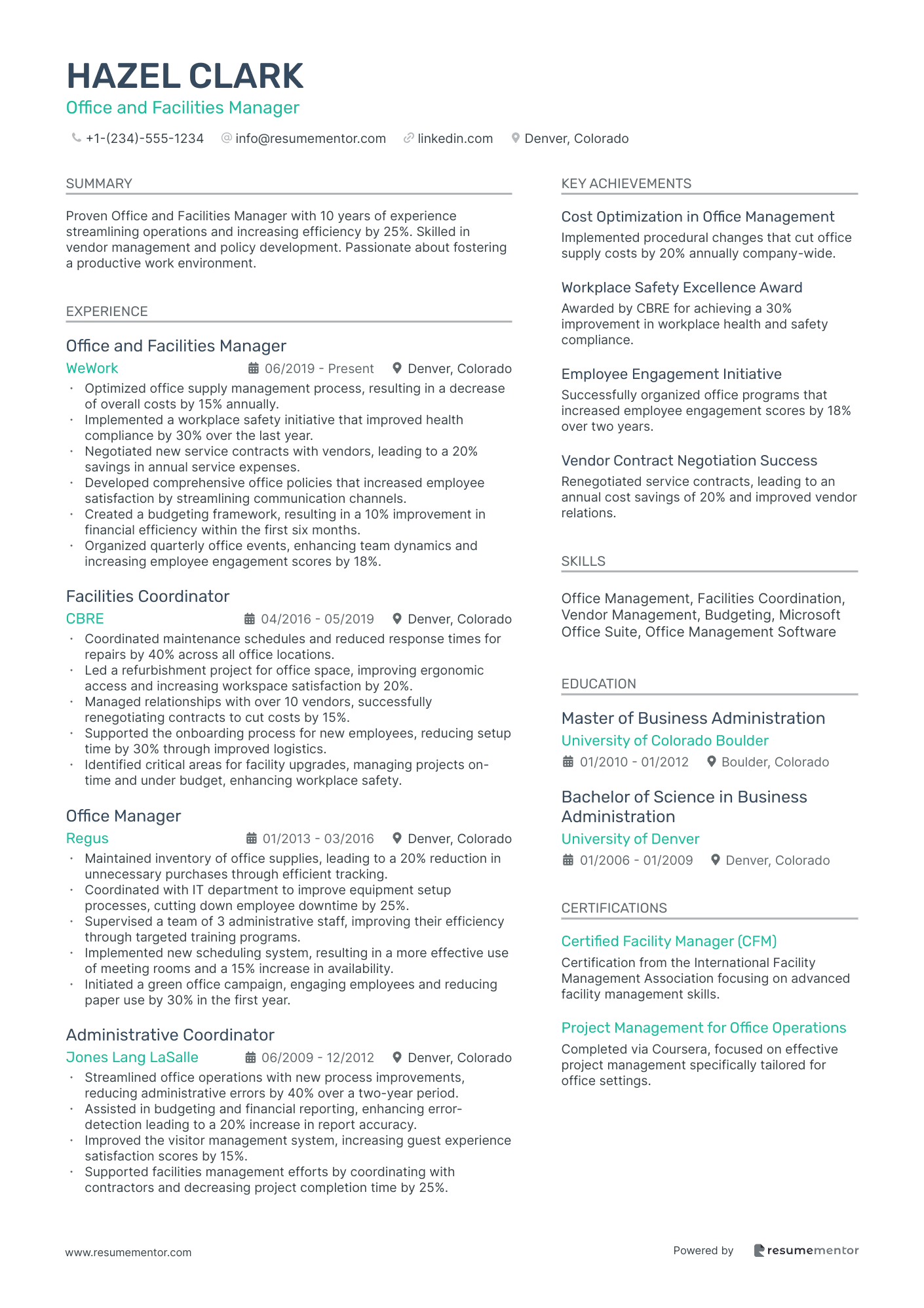
Office and Facilities Manager
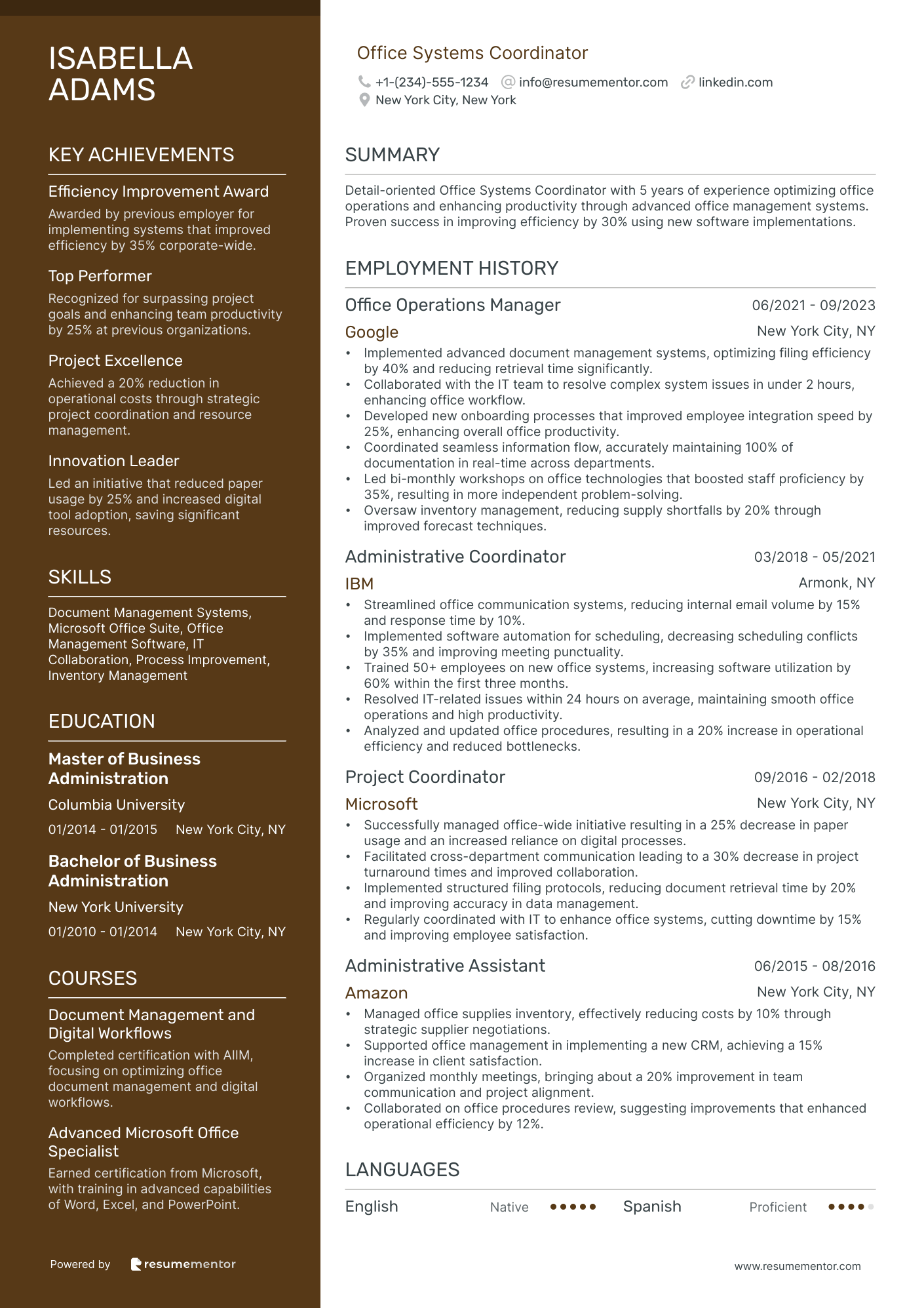
Office Systems Coordinator
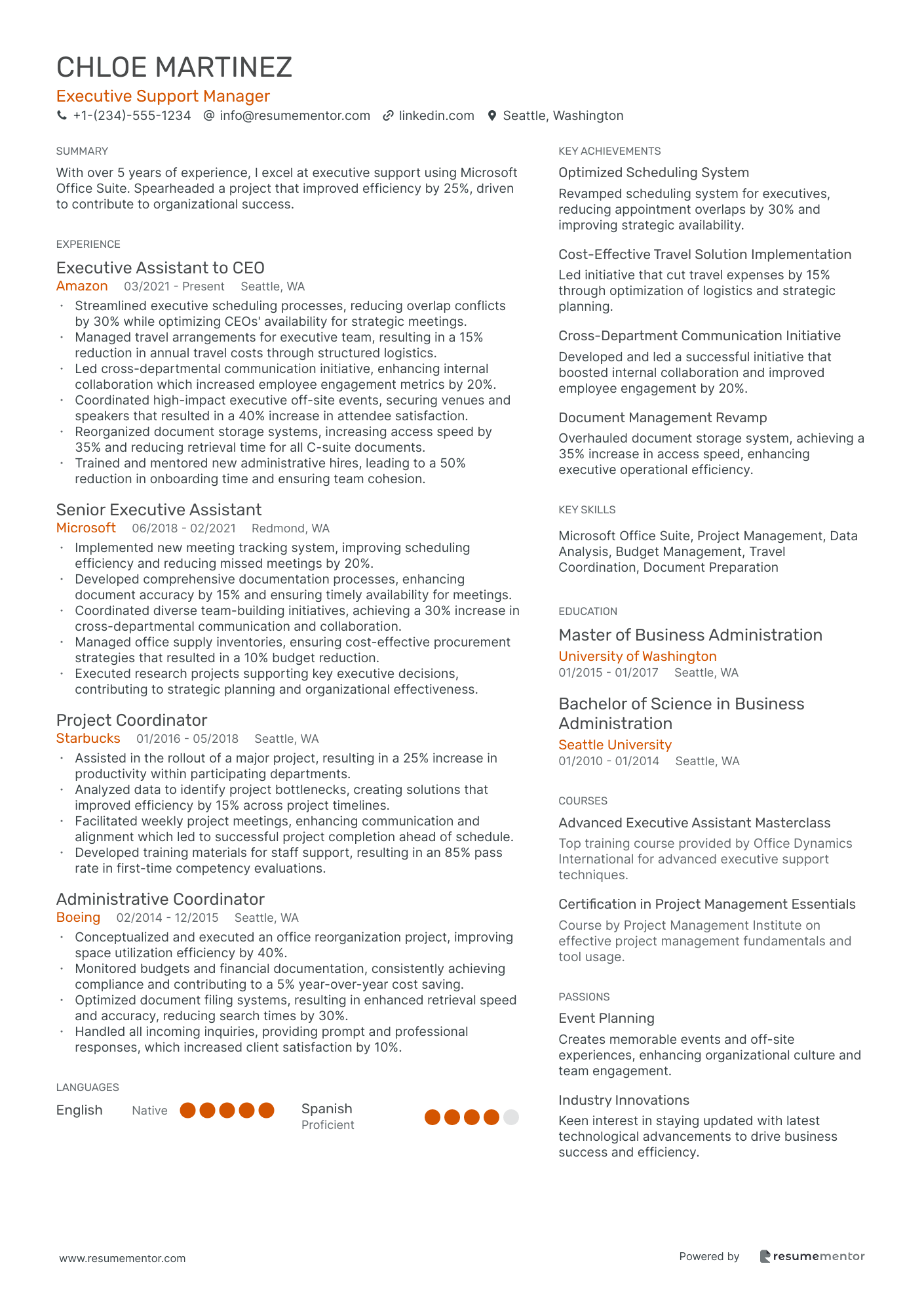
Executive Support Manager
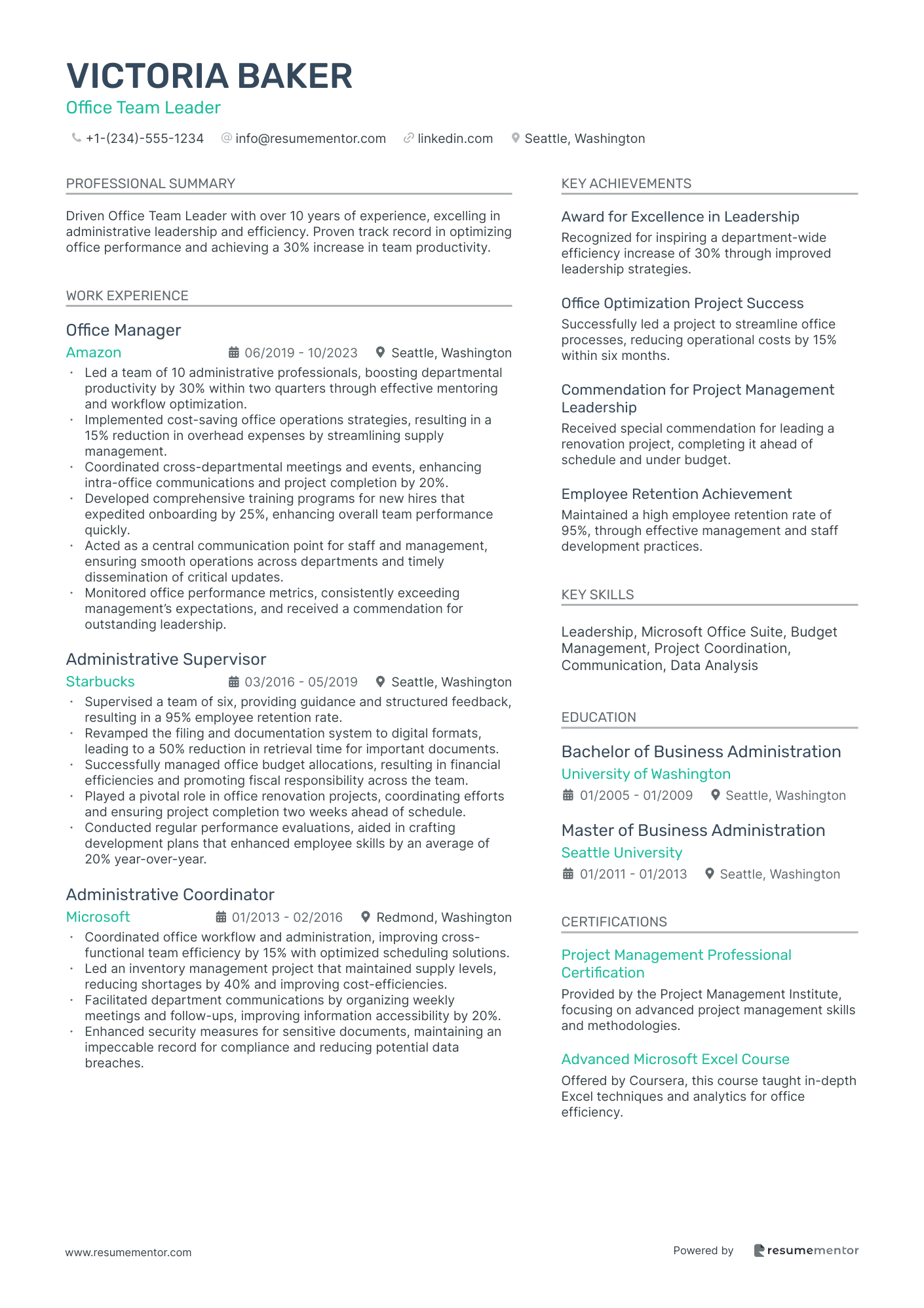
Office Team Leader
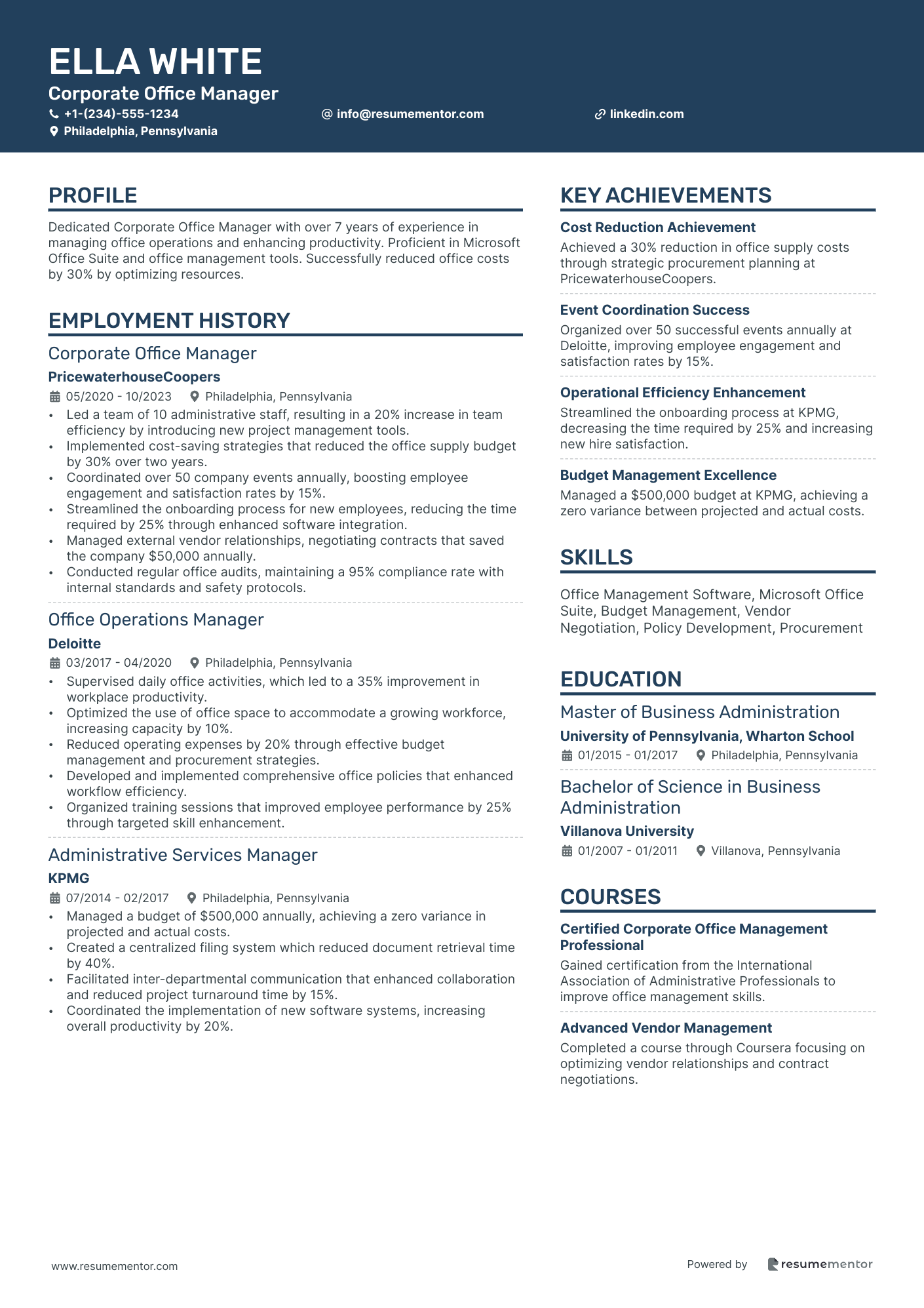
Corporate Office Manager
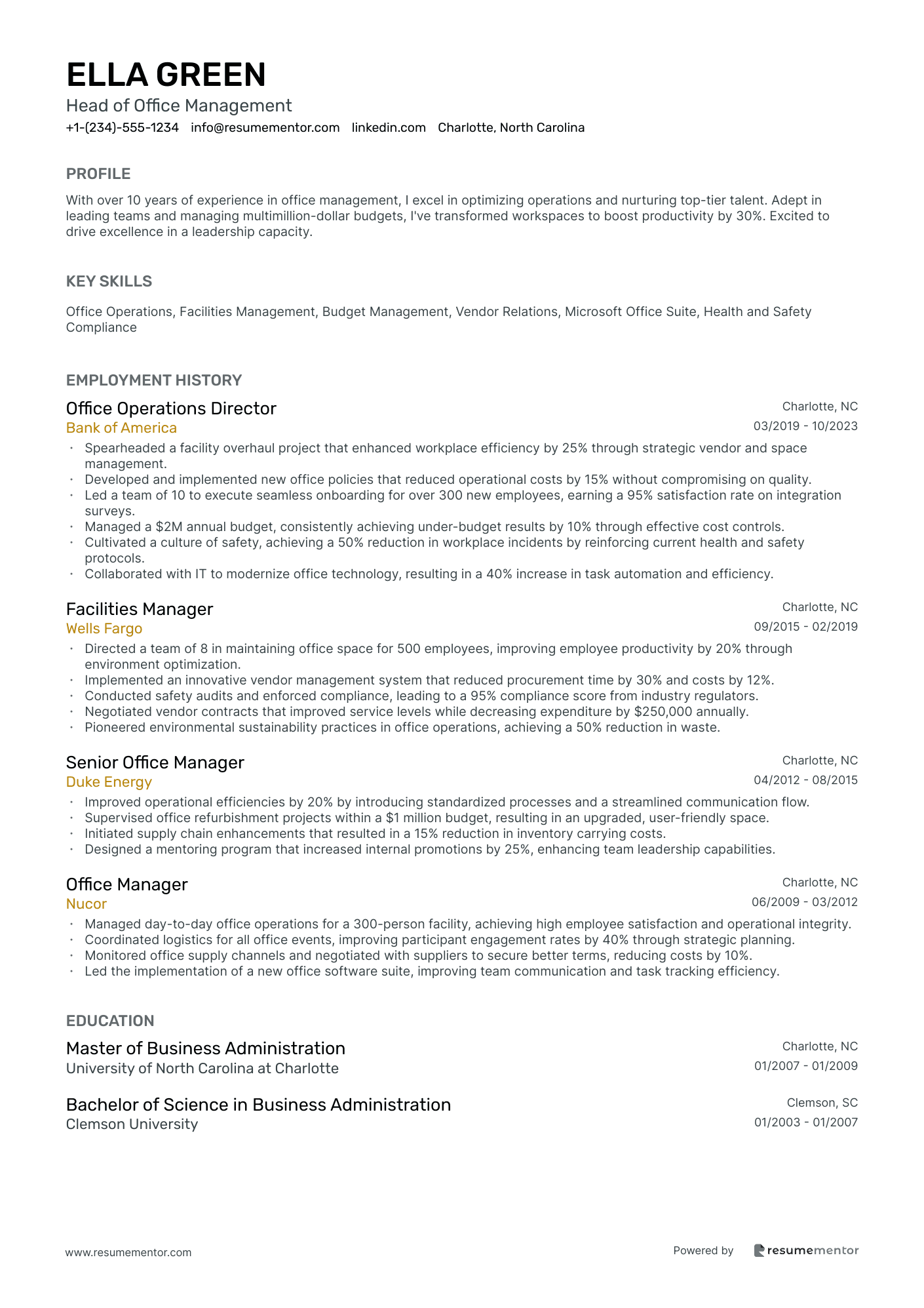
Head of Office Management
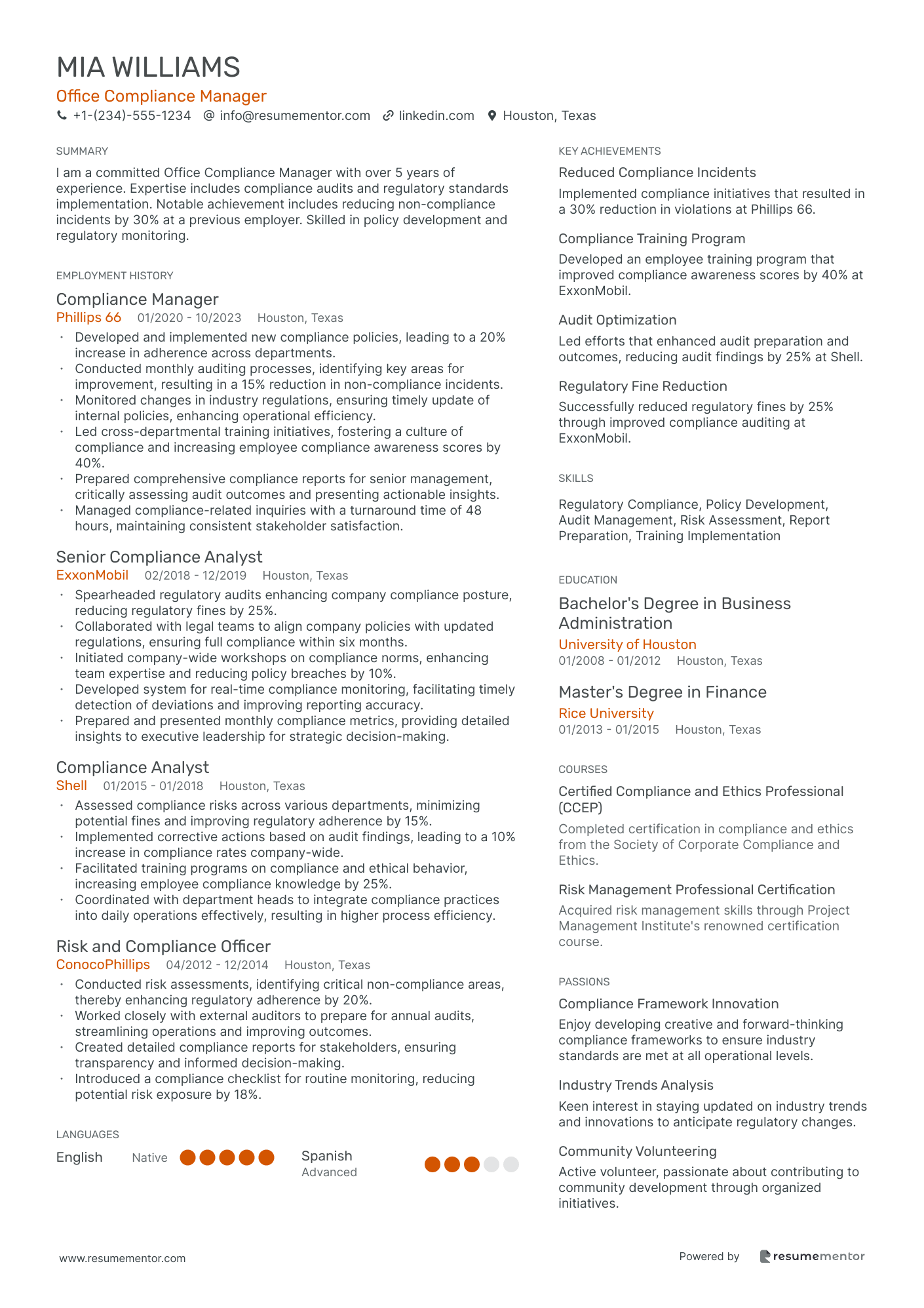
Office Compliance Manager

Administrative Services Manager resume sample
- •Managed a team of 15 administrative personnel, spearheading training programs that improved staff productivity by 30%.
- •Implemented a new records management system, decreasing retrieval times by 40% and enhancing operational efficiency.
- •Led procurement processes for office supplies, achieving a 20% cost reduction through vendor negotiations and process optimizations.
- •Developed comprehensive department budgets aligning with organizational objectives, and reduced department costs by 15%.
- •Facilitated interdepartmental communication through the introduction of collaborative tools, improving project turnaround by 25%.
- •Coordinated office relocations and space planning, resulting in a 10% improvement in workspace utilization.
- •Supervised administrative operations, optimizing workflow processes which improved departmental efficiency by 22%.
- •Orchestrated office redesign projects, enhancing the workspace, and boosting employee morale.
- •Managed the onboarding of new administrative staff, improving integration by reducing initial learning curves by 15%.
- •Established a new correspondence system, increasing internal and external communication effectiveness by 30%.
- •Coordinated and managed logistics for corporate events, within budget, resulting in improved stakeholder satisfaction.
- •Facilitated the implementation of new administrative policies, improving service delivery consistency by 18%.
- •Managed inventory controls, reducing supply shortages by 35% and maintaining a seamless office operation.
- •Supported financial reporting processes, contributing to budget analysis and variance reporting with accurate data.
- •Assisted in the reorganization of filing systems, which decreased document retrieval times.
- •Provided comprehensive executive support to the senior management team, enhancing executive productivity.
- •Streamlined calendaring systems, resulting in a 20% increase in scheduling efficiency.
- •Coordinated travel arrangements, maintaining budget compliance and improving travel cost efficiency.
- •Maintained confidential information management systems, increasing data security within the office.
Office Operations Supervisor resume sample
- •Implemented new office policies resulting in a 40% reduction in administrative processing time over six months.
- •Managed a team of 15 staff, improving efficiency and team satisfaction scores by 25% within a year.
- •Orchestrated office relocations affecting over 200 staff members with minimal disruptions and optimal workflow continuity.
- •Developed comprehensive office budget plans, maintaining expenditures 10% below annual projections for two consecutive years.
- •Negotiated vendor contracts, achieving an average 15% savings across all office services and supplies.
- •Led cross-departmental collaboration initiatives, enhancing interdepartmental communication by 30%.
- •Spearheaded office staff training programs that cut onboarding time by 25% and elevated productivity amongst new hires.
- •Centralized office supply purchases, reducing delays and improving departmental requests by 35%.
- •Developed a digital archiving system leading to a 50% reduction in document retrieval times company-wide.
- •Coordinated renovation projects, streamlining costs and enhancing workspace efficiency by 20%.
- •Oversaw HR processes for recruitment drives, contributing to a 15% increase in hiring efficiency.
- •Guided office reorganization projects to improve departmental collaboration, decreasing inter-departmental request response times by 30%.
- •Implemented software tools that improved record-keeping accuracy by over 40%.
- •Analyzed office operation data, providing insights that led to a company-wide policy overhaul and increased efficiency.
- •Optimized the procurement process, decreasing office supply expenditure by 15% over the first year.
- •Supervised administrative support team, significantly improving workflow coordination and task completion rates.
- •Managed office supply orders, ensuring uninterrupted operations and achieving a 10% reduction in unnecessary purchases.
- •Assisted with the implementation of new facility management protocols, enhancing staff safety and compliance.
- •Developed training manuals used across multiple departments, resulting in better staff onboarding experiences.
Business Administration Manager resume sample
- •Developed and implemented new operational procedures that reduced processing time by 25% within one year.
- •Managed a $5 million departmental budget with a cost-saving initiative that lowered expenses by 20%, contributing greatly to annual profit gains.
- •Facilitated cross-functional communication for a team of over 50, improving project completion rates by 15% through enhanced collaboration strategies.
- •Led a team of 15 administrative professionals, focusing on skill enhancement, resulting in a 95% employee satisfaction score in quarterly surveys.
- •Introduced a data-driven approach to performance monitoring, identifying key trends and improving decision accuracy by 35%.
- •Streamlined internal reporting processes which increased report delivery speed by 40% and improved data accuracy.
- •Oversaw daily operations for the administrative team, achieving a 99% on-time delivery of critical administrative tasks consistently.
- •Implemented a new project management software that enhanced productivity by 10%, enabling better task tracking and resource allocation.
- •Collaborated with senior leadership to align company objectives with departmental functions, optimizing resource use and achieving targets.
- •Coordinated budgeting and reporting processes for multiple departments, enhancing financial visibility and control across the organization.
- •Analyzed operational data to propose strategic changes, resulting in increased process efficiency and cost savings.
- •Assisted in developing a comprehensive communication strategy for inter-departmental projects, raising engagement scores by 20% overall.
- •Managed reporting tasks and performance monitoring, streamlining processes and improving presentation effectiveness for stakeholders.
- •Collaborated with IT to enhance data analytics tools, facilitating more informed decision-making processes across multiple departments.
- •Led monthly administrative workshops designed to improve team efficiency, praised for effectiveness by the executive leadership team.
- •Coordinated logistical aspects of projects, ensuring adherence to deadlines and ultimately raising project efficiency by 30%.
- •Supported senior management in long-term goal setting through rigorous data analysis, resulting in a strategic operational pivot.
- •Enhanced communication frameworks between operational teams, which led to quicker resolution times for departmental issues.
- •Acted as a key contact for administrative procedures, fostering a reliable and consistent flow of operations across the office.
Office and Facilities Manager resume sample
- •Optimized office supply management process, resulting in a decrease of overall costs by 15% annually.
- •Implemented a workplace safety initiative that improved health compliance by 30% over the last year.
- •Negotiated new service contracts with vendors, leading to a 20% savings in annual service expenses.
- •Developed comprehensive office policies that increased employee satisfaction by streamlining communication channels.
- •Created a budgeting framework, resulting in a 10% improvement in financial efficiency within the first six months.
- •Organized quarterly office events, enhancing team dynamics and increasing employee engagement scores by 18%.
- •Coordinated maintenance schedules and reduced response times for repairs by 40% across all office locations.
- •Led a refurbishment project for office space, improving ergonomic access and increasing workspace satisfaction by 20%.
- •Managed relationships with over 10 vendors, successfully renegotiating contracts to cut costs by 15%.
- •Supported the onboarding process for new employees, reducing setup time by 30% through improved logistics.
- •Identified critical areas for facility upgrades, managing projects on-time and under budget, enhancing workplace safety.
- •Maintained inventory of office supplies, leading to a 20% reduction in unnecessary purchases through efficient tracking.
- •Coordinated with IT department to improve equipment setup processes, cutting down employee downtime by 25%.
- •Supervised a team of 3 administrative staff, improving their efficiency through targeted training programs.
- •Implemented new scheduling system, resulting in a more effective use of meeting rooms and a 15% increase in availability.
- •Initiated a green office campaign, engaging employees and reducing paper use by 30% in the first year.
- •Streamlined office operations with new process improvements, reducing administrative errors by 40% over a two-year period.
- •Assisted in budgeting and financial reporting, enhancing error-detection leading to a 20% increase in report accuracy.
- •Improved the visitor management system, increasing guest experience satisfaction scores by 15%.
- •Supported facilities management efforts by coordinating with contractors and decreasing project completion time by 25%.
Office Systems Coordinator resume sample
- •Implemented advanced document management systems, optimizing filing efficiency by 40% and reducing retrieval time significantly.
- •Collaborated with the IT team to resolve complex system issues in under 2 hours, enhancing office workflow.
- •Developed new onboarding processes that improved employee integration speed by 25%, enhancing overall office productivity.
- •Coordinated seamless information flow, accurately maintaining 100% of documentation in real-time across departments.
- •Led bi-monthly workshops on office technologies that boosted staff proficiency by 35%, resulting in more independent problem-solving.
- •Oversaw inventory management, reducing supply shortfalls by 20% through improved forecast techniques.
- •Streamlined office communication systems, reducing internal email volume by 15% and response time by 10%.
- •Implemented software automation for scheduling, decreasing scheduling conflicts by 35% and improving meeting punctuality.
- •Trained 50+ employees on new office systems, increasing software utilization by 60% within the first three months.
- •Resolved IT-related issues within 24 hours on average, maintaining smooth office operations and high productivity.
- •Analyzed and updated office procedures, resulting in a 20% increase in operational efficiency and reduced bottlenecks.
- •Successfully managed office-wide initiative resulting in a 25% decrease in paper usage and an increased reliance on digital processes.
- •Facilitated cross-department communication leading to a 30% decrease in project turnaround times and improved collaboration.
- •Implemented structured filing protocols, reducing document retrieval time by 20% and improving accuracy in data management.
- •Regularly coordinated with IT to enhance office systems, cutting downtime by 15% and improving employee satisfaction.
- •Managed office supplies inventory, effectively reducing costs by 10% through strategic supplier negotiations.
- •Supported office management in implementing a new CRM, achieving a 15% increase in client satisfaction.
- •Organized monthly meetings, bringing about a 20% improvement in team communication and project alignment.
- •Collaborated on office procedures review, suggesting improvements that enhanced operational efficiency by 12%.
Executive Support Manager resume sample
- •Streamlined executive scheduling processes, reducing overlap conflicts by 30% while optimizing CEOs' availability for strategic meetings.
- •Managed travel arrangements for executive team, resulting in a 15% reduction in annual travel costs through structured logistics.
- •Led cross-departmental communication initiative, enhancing internal collaboration which increased employee engagement metrics by 20%.
- •Coordinated high-impact executive off-site events, securing venues and speakers that resulted in a 40% increase in attendee satisfaction.
- •Reorganized document storage systems, increasing access speed by 35% and reducing retrieval time for all C-suite documents.
- •Trained and mentored new administrative hires, leading to a 50% reduction in onboarding time and ensuring team cohesion.
- •Implemented new meeting tracking system, improving scheduling efficiency and reducing missed meetings by 20%.
- •Developed comprehensive documentation processes, enhancing document accuracy by 15% and ensuring timely availability for meetings.
- •Coordinated diverse team-building initiatives, achieving a 30% increase in cross-departmental communication and collaboration.
- •Managed office supply inventories, ensuring cost-effective procurement strategies that resulted in a 10% budget reduction.
- •Executed research projects supporting key executive decisions, contributing to strategic planning and organizational effectiveness.
- •Assisted in the rollout of a major project, resulting in a 25% increase in productivity within participating departments.
- •Analyzed data to identify project bottlenecks, creating solutions that improved efficiency by 15% across project timelines.
- •Facilitated weekly project meetings, enhancing communication and alignment which led to successful project completion ahead of schedule.
- •Developed training materials for staff support, resulting in an 85% pass rate in first-time competency evaluations.
- •Conceptualized and executed an office reorganization project, improving space utilization efficiency by 40%.
- •Monitored budgets and financial documentation, consistently achieving compliance and contributing to a 5% year-over-year cost saving.
- •Optimized document filing systems, resulting in enhanced retrieval speed and accuracy, reducing search times by 30%.
- •Handled all incoming inquiries, providing prompt and professional responses, which increased client satisfaction by 10%.
Office Team Leader resume sample
- •Led a team of 10 administrative professionals, boosting departmental productivity by 30% within two quarters through effective mentoring and workflow optimization.
- •Implemented cost-saving office operations strategies, resulting in a 15% reduction in overhead expenses by streamlining supply management.
- •Coordinated cross-departmental meetings and events, enhancing intra-office communications and project completion by 20%.
- •Developed comprehensive training programs for new hires that expedited onboarding by 25%, enhancing overall team performance quickly.
- •Acted as a central communication point for staff and management, ensuring smooth operations across departments and timely dissemination of critical updates.
- •Monitored office performance metrics, consistently exceeding management’s expectations, and received a commendation for outstanding leadership.
- •Supervised a team of six, providing guidance and structured feedback, resulting in a 95% employee retention rate.
- •Revamped the filing and documentation system to digital formats, leading to a 50% reduction in retrieval time for important documents.
- •Successfully managed office budget allocations, resulting in financial efficiencies and promoting fiscal responsibility across the team.
- •Played a pivotal role in office renovation projects, coordinating efforts and ensuring project completion two weeks ahead of schedule.
- •Conducted regular performance evaluations, aided in crafting development plans that enhanced employee skills by an average of 20% year-over-year.
- •Coordinated office workflow and administration, improving cross-functional team efficiency by 15% with optimized scheduling solutions.
- •Led an inventory management project that maintained supply levels, reducing shortages by 40% and improving cost-efficiencies.
- •Facilitated department communications by organizing weekly meetings and follow-ups, improving information accessibility by 20%.
- •Enhanced security measures for sensitive documents, maintaining an impeccable record for compliance and reducing potential data breaches.
- •Maintained office areas, leading to a 100% compliance score in company audits for office cleanliness and organization.
- •Assisted in planning and executing company events, which improved employee engagement scores by 25%.
- •Managed confidential information with a high level of discretion, earning recognition for ensuring information safety and trustworthiness.
- •Supported administrative tasks, contributing to a 20% increase in overall department productivity by adopting new office tools.
Corporate Office Manager resume sample
- •Led a team of 10 administrative staff, resulting in a 20% increase in team efficiency by introducing new project management tools.
- •Implemented cost-saving strategies that reduced the office supply budget by 30% over two years.
- •Coordinated over 50 company events annually, boosting employee engagement and satisfaction rates by 15%.
- •Streamlined the onboarding process for new employees, reducing the time required by 25% through enhanced software integration.
- •Managed external vendor relationships, negotiating contracts that saved the company $50,000 annually.
- •Conducted regular office audits, maintaining a 95% compliance rate with internal standards and safety protocols.
- •Supervised daily office activities, which led to a 35% improvement in workplace productivity.
- •Optimized the use of office space to accommodate a growing workforce, increasing capacity by 10%.
- •Reduced operating expenses by 20% through effective budget management and procurement strategies.
- •Developed and implemented comprehensive office policies that enhanced workflow efficiency.
- •Organized training sessions that improved employee performance by 25% through targeted skill enhancement.
- •Managed a budget of $500,000 annually, achieving a zero variance in projected and actual costs.
- •Created a centralized filing system which reduced document retrieval time by 40%.
- •Facilitated inter-departmental communication that enhanced collaboration and reduced project turnaround time by 15%.
- •Coordinated the implementation of new software systems, increasing overall productivity by 20%.
- •Enhanced the scheduling process for over 100 client meetings, improving efficiency by 30%.
- •Streamlined administrative operations, reducing redundancies and cutting response times by 20%.
- •Collaborated with the finance team to track and reconcile discrepancies, maintaining 100% accuracy.
- •Developed a resource management plan that improved cost efficiency by 15%.
Head of Office Management resume sample
- •Spearheaded a facility overhaul project that enhanced workplace efficiency by 25% through strategic vendor and space management.
- •Developed and implemented new office policies that reduced operational costs by 15% without compromising on quality.
- •Led a team of 10 to execute seamless onboarding for over 300 new employees, earning a 95% satisfaction rate on integration surveys.
- •Managed a $2M annual budget, consistently achieving under-budget results by 10% through effective cost controls.
- •Cultivated a culture of safety, achieving a 50% reduction in workplace incidents by reinforcing current health and safety protocols.
- •Collaborated with IT to modernize office technology, resulting in a 40% increase in task automation and efficiency.
- •Directed a team of 8 in maintaining office space for 500 employees, improving employee productivity by 20% through environment optimization.
- •Implemented an innovative vendor management system that reduced procurement time by 30% and costs by 12%.
- •Conducted safety audits and enforced compliance, leading to a 95% compliance score from industry regulators.
- •Negotiated vendor contracts that improved service levels while decreasing expenditure by $250,000 annually.
- •Pioneered environmental sustainability practices in office operations, achieving a 50% reduction in waste.
- •Improved operational efficiencies by 20% by introducing standardized processes and a streamlined communication flow.
- •Supervised office refurbishment projects within a $1 million budget, resulting in an upgraded, user-friendly space.
- •Initiated supply chain enhancements that resulted in a 15% reduction in inventory carrying costs.
- •Designed a mentoring program that increased internal promotions by 25%, enhancing team leadership capabilities.
- •Managed day-to-day office operations for a 300-person facility, achieving high employee satisfaction and operational integrity.
- •Coordinated logistics for all office events, improving participant engagement rates by 40% through strategic planning.
- •Monitored office supply channels and negotiated with suppliers to secure better terms, reducing costs by 10%.
- •Led the implementation of a new office software suite, improving team communication and task tracking efficiency.
Office Compliance Manager resume sample
- •Developed and implemented new compliance policies, leading to a 20% increase in adherence across departments.
- •Conducted monthly auditing processes, identifying key areas for improvement, resulting in a 15% reduction in non-compliance incidents.
- •Monitored changes in industry regulations, ensuring timely update of internal policies, enhancing operational efficiency.
- •Led cross-departmental training initiatives, fostering a culture of compliance and increasing employee compliance awareness scores by 40%.
- •Prepared comprehensive compliance reports for senior management, critically assessing audit outcomes and presenting actionable insights.
- •Managed compliance-related inquiries with a turnaround time of 48 hours, maintaining consistent stakeholder satisfaction.
- •Spearheaded regulatory audits enhancing company compliance posture, reducing regulatory fines by 25%.
- •Collaborated with legal teams to align company policies with updated regulations, ensuring full compliance within six months.
- •Initiated company-wide workshops on compliance norms, enhancing team expertise and reducing policy breaches by 10%.
- •Developed system for real-time compliance monitoring, facilitating timely detection of deviations and improving reporting accuracy.
- •Prepared and presented monthly compliance metrics, providing detailed insights to executive leadership for strategic decision-making.
- •Assessed compliance risks across various departments, minimizing potential fines and improving regulatory adherence by 15%.
- •Implemented corrective actions based on audit findings, leading to a 10% increase in compliance rates company-wide.
- •Facilitated training programs on compliance and ethical behavior, increasing employee compliance knowledge by 25%.
- •Coordinated with department heads to integrate compliance practices into daily operations effectively, resulting in higher process efficiency.
- •Conducted risk assessments, identifying critical non-compliance areas, thereby enhancing regulatory adherence by 20%.
- •Worked closely with external auditors to prepare for annual audits, streamlining operations and improving outcomes.
- •Created detailed compliance reports for stakeholders, ensuring transparency and informed decision-making.
- •Introduced a compliance checklist for routine monitoring, reducing potential risk exposure by 18%.
The success of the office rests firmly on your shoulders. When things are going well, you’re the professional working tirelessly behind-the-scenes to make it happen. When things go wrong, you’re the person who has to step in and deal with crisis management.
As a savvy office manager, you need to wear many different hats. From admin support and supervising your staff to budget and facilities management, you quite literally do it all. But how can you convince a recruiter you have what it takes to succeed?
Sugaring your diverse skill set on your resume is never easy. As if that wasn’t enough to manage, you also need to tailor your resume for the position, get past the applicant tracking system (ATS), and show that you can achieve hard-hitting, tangible results.
Not sure where to start? You’ve come to the right place. In this guide, we’ll take a look at everything you need to know about writing an interview-winning office manager resume.
Key takeaways
- Highlight your leadership abilities, administrative expertise, and proficiency with office management software to demonstrate your ability to oversee the smooth running of an office.
- Tailor your resume to match the specific office manager role by using keywords from the job description, guaranteeing you meet the employer’s exact needs and expectations.
- Quantify your achievements where possible to show the tangible impact you’ve made.
- Use a reverse-chronological resume format to clearly detail your most recent accomplishments and positions, which recruiters typically prefer.
- Include any relevant certifications, such as the Certified Administrative Professional (CAP) or office management training, to bolster your qualifications and prove your dedication to the field.
- Ensure your work experience section displays specific accomplishments that demonstrate your ability to drive results and use bullet points to highlight key achievements.
How to use this office manager resume guide
Before we get started, let’s have a quick chat about this guide. We’ve shared a ton of advice on how to create an office manager resume including adaptable examples. But how can you make sure that you get the most out of this resume writing guide?
Check out our tips below to help you get started:
- Learn the fundamentals by understanding the key sections and must-have skills for an excellent office manager resume.
- Get a quick overview by reviewing essential takeaways to craft a compelling resume.
- Follow our step-by-step guide to illustrate your administrative expertise, team leadership, and organizational skills.
- Use our resume builder to easily format your resume with a drag-and-drop tool including all critical sections.
- See real resume examples to learn from professionals who successfully showcase their office management skills.
- Apply expert tips to ensure your resume is polished, professional, and optimized for applicant tracking systems (ATS).
- Leverage trusted resources like job boards such as Indeed, Glassdoor, and LinkedIn for industry-specific guidance.
- Focus on your leadership skills and style. Don’t be afraid to use the STAR method when sharing your past achievements.
- Mention the software you’re proficient in—for example, Xero, Monday, Slack and Zoom.
- Keep your resume updated by regularly adding new certifications, efficiency improvements, and process optimizations.
Is your resume good enough?
Drop your resume here or choose a file.
PDF & DOCX only. Max 2MB file size.
What to focus on when writing your office manager resume
Recruiters aren’t simply looking for office managers who can lead staff—although that’s a large part of your job. They also want to know that you can deal with the admin, keep track of the budget, and deal with any potential HR issues. It’s a tall order.
When writing your office manager resume, focus on specific achievements, office management software proficiency, and leadership examples. It’s not about just ticking the right boxes—your goal is to highlight the value you bring to the business.
Let’s take a look at the main angles you want to take here:
Specific (and tangible) achievements
Your achievements speak for themselves. Whether you’ve effectively managed budgets, have a stellar staff retention rate, or increased productivity—these attributes will make you shine.
Don’t be afraid to brag about these resume accomplishments. They’ll set you apart from the crowd and make the hiring manager think twice about your application. Wherever possible, add solid metrics—such as statistics and numbers—to show the influence your work has had.
PRO TIP
Always think about the bottom line. Clear statistics that detail your impact make a big impression on the hiring manager. Include this in your summary or work experience section.
Let’s take a look at an example:
“Proven ability to reduce office expenses by 20% through budget optimization and dynamic vendor negotiations.”
Software proficiency
Modern professionals need to be computer literate. But office managers have to take things one step further. To excel in this role, you’ll need to have experience using office management software. Include the software you can use in the skills section of your resume.
Once you’ve done that, mention the software or tools in your work experience section. When bullet-pointing your achievements, weave the names of the software into the text and add some much-needed context to them.
Want to know which tools and software to include?
Check the job announcement and see if the recruiter has listed any “must-haves” there.
Here are some of the most in-demand manager software:
- Office admin tools: Microsoft Office Suite and Google Workspace.
- Productivity software: Trello, Asana, and Monday.
- Accounting: Xero and QuickBooks.
- Communication: Zoom, Slack, and Google Teams.
- HR and payroll: Deel, ADP, and BambooHR.
Leadership examples
Office managers need to inspire the workforce. It’s your job to make sure that everyone understands their duties, stays on track, and hits their targets. That can be a tricky task. However, each manager has their own way of motivating the rest of the team.
Use your office manager resume as a chance to show off your leadership skills. Include anecdotes of any challenges you’ve faced and, ultimately, how you overcame them.
STAR method
Use the this method when sharing examples of your leadership skills.
Let’s break that down:
- Situation: Brief overview of the challenge or circumstance.
- Task: Explain the specific goal or responsibility you needed to accomplish.
- Action: Describe the steps you took to address the situation.
- Result: The outcome of your actions, including measurable achievements.
Here’s an example:
“Faced with inefficiencies due to outdated processes and lack of team coordination, I took the initiative to streamline office operations and improve productivity. I led a team of 10 administrative staff, implemented workflow automation tools, and introduced a new task delegation system to enhance efficiency. As a result, team productivity increased by 30%, processing errors decreased by 20%, and overall office operations became more organized and effective.”
Simple and professional layout
Focus on the above approaches when writing your resume. But also pay close attention to the resume layout. Your document needs to be easy to read and skimmable.
If it’s hard for the reader to get the information they need, they’ll toss your resume on the trash pile. Choose a simple design that effortlessly highlights your biggest brags. Also include bullet points wherever you can.
Now you understand why the layout matters, let’s look into the right format.
How to choose the right resume format
The resume format simply means the structure of the document. There are three main options here: reverse-chronological, functional, and combination format.
If you’ve had a straightforward career, we recommend the reverse-chronological format. This starts with your most recent experience at the top of the page and works back in time. It’s what recruiters expect to see, and so it works best in most scenarios.
Of course, there are exceptions to this rule. If you have no direct work experience in the industry but have still worked as a manager, try a functional format. This approach groups your experiences by skills.
What resume format should I use?
For most office managers, a reverse-chronological order works best.
Should I include a headshot on my retail resume?
No. Office managers don’t need to attach a headshot as part of their resume.
How should you save your resume file?
You should always save your resume as a PDF. Word Doc can be edited or changed after you’ve submitted it.
Bonus: PDFs look professional and you can be certain the formatting won’t change.
How large should your resume margins be?
Don’t underestimate the power of white space. Resume margins should be between 0.5 to 1 inch.
How much does the resume font matter?
Tempted to get creative with your resume font? It’s not worth the hassle.
Choose an accessible font for the hiring manager. Sans-serif fonts, like Arial and Rubik, are always a safe option.
Can I make a resume using Word?
While you can design your own resume using Word, it may not look very professional. It can be extremely fiddly to get right, too.
Luckily, our drag-and-drop resume builder is the answer. We have a wide range of resume templates to help you along the way.
You already know the basics—shall we get down to it? Let’s take a look at your header first.
What to include in your resume header
Your resume header sits at the top of the document. It’s like a business card because it displays your basic details. Make sure that this is prominent and clear.
Here’s what to include:
- Your name: Write your first and last name.
- Job title: Next, list the job title for the role you’re going for. Here, that’ll be “Office Manager.”
- Contact details: Make sure the hiring manager can contact you. Add your professional email address and a phone number you use regularly.
- Location: You don’t need to share your full address, just your general location (i.e. city and state).
How to write a resume summary
Ready to talk about what makes you an ace office manager? Save it for your resume summary.
This short statement is usually the first thing that the hiring manager will read. You need to make it count. It’s not just about filling space—every word needs to add value.
Consider what your Unique Selling Proposition (USP) is. What is it that makes you better than other candidates? What do you have that they likely lack?
PRO TIP
Get creative with your words. Adopting direct, persuasive language is a sure-fire way to grab the reader’s attention. Resume action words can make your summary more impactful.
Don’t know where to start? Here are some key points you may want to include in your office manager resume summary:
- How long you’ve worked as an office manager.
- Your managerial style and how you motivate staff.
- Your staff retention rate and budgeting accolades.
- Any awards or training you have under your belt.
Check the job advert before you write this statement. Aligning your summary with the company’s needs is a speedy way to get ahead of the competition.
Focusing on the staff retention rate and an admirable award makes this resume summary stand out. The hiring manager can quickly see what a talented candidate the professional is.
How to write a quantifiable resume experience section
Listing your work experience on your resume is a must. But why stop there? This is the resume section where your past achievements can truly shine. Quantifying your accomplishments lets the hiring manager know what they can expect of you in the future.
Wondering how far back to go on your resume? We recommend no further than 10-15 years. While you may have worked in offices for longer than that, putting a ton of work experience on your resume can lead to problems, such as age discrimination.
For each position, write down the company name, location, your title, and the dates you were employed. Next, slide in some bullet points that cover your top accomplishments in the role.
Here’s an example:
- •Managed a team of 12 administrative staff, increasing efficiency by 30% through process automation and workflow improvements.
- •Reduced office expenses by 20% by renegotiating vendor contracts and implementing cost-saving initiatives.
- •Implemented a new onboarding and training program, improving employee retention by 25% over two years.
- •Oversaw an annual budget of $750K, ensuring financial efficiency and cost control without compromising operational quality.
- •Led the transition to a cloud-based document management system, cutting paper usage by 40% and enhancing collaboration.
With plenty of hard-hitting statistics and numbers, the above work experience section is a real winner. Whenever you can feature solid facts—do it.
Office manager resume work experience samples
Writing an interview-winning resume is all about focusing on your professional strengths. Unsurprisingly, you have several approaches to choose from.
Let’s take a look:
Budget focused
Are you a master at cutting costs? If you’ve lowered overheads for a company, that’s sure to dazzle the hiring manager. Be clear about how and where you managed to cut back.
- •Cut office overhead costs by 25% by renegotiating supplier contracts, implementing bulk purchasing, and optimizing vendor management.
- •Reduced utility expenses by 30% through energy-efficient office upgrades and enforcing a hybrid work schedule.
- •Streamlined procurement processes, decreasing supply waste by 40% and improving budget forecasting accuracy.
- •Implemented a digital record-keeping system, reducing paper expenses by 50% and improving document retrieval efficiency.
- •Optimized office space utilization, leading to a 20% reduction in real estate costs while maintaining employee productivity.
Leadership focused
Office managers have to be natural-born leaders. What makes you an amazing manager? Seize the opportunity to talk about your motivational approaches and techniques.
- •Managed and mentored a team of 15 administrative professionals, increasing productivity by 35 percent through leadership training and clear performance benchmarks.
- •Improved employee retention by 30 percent by implementing professional development programs and a recognition system for top performers.
- •Led a company-wide office restructuring project, optimizing workflow efficiency and reducing operational bottlenecks.
- •Developed and enforced new policies that streamlined office communication, cutting internal response times by 40 percent.
- •Spearheaded the adoption of project management software, enhancing team collaboration and reducing missed deadlines by 25 percent.
Innovation focused
Do you have what it takes to shake up an office? If you’re in the business of saving failing departments, let the hiring manager know about it. Highlight your past wins here.
- •Restructured underperforming administrative teams, leading a turnaround that increased efficiency by 50 percent within one year.
- •Developed and deployed an automated workflow system that reduced task completion times by 40 percent and eliminated bottlenecks in key business operations.
- •Identified and resolved gaps in interdepartmental communication by implementing a centralized digital platform, cutting miscommunication errors by 60 percent.
- •Introduced a data-driven approach to office resource management, lowering operational costs by 30 percent while improving service delivery.
- •Revamped outdated training and onboarding programs, reducing new hire ramp-up time by 25 percent and increasing employee satisfaction scores.
Listing your skills on your resume
Knowing what skills to put on a resume is an art. Don’t just whack random skills onto the page and hope for the best. Instead, you’ll want to use a more targeted approach.
Return to the job announcement and take a peek at the core criteria. Chances are, you’ll find a bunch of “must-have” skills there to insert in this section.
Repeat the recruiter
Use the same language as the recruiter. When adding skills to your resume, match the wording from the advert—so long as it applies—and use it verbatim.
This approach is not only quick for grabbing attention but can also boost your ATS ranking.
Office managers need a selection of hard and soft skills. Hard skills are technical and apply directly to the job itself. Soft skills are more like traits that help you get the job done.
Here’s an example of a good skills section:
Best hard skills to feature on your office manager resume
It’s likely that you have a diverse selection of hard skills. These are the technical skills and know-how you use every day when working as an office manager.
Think about the most in-demand resume competencies first. Include talents like knowing how to use certain software, accounting, and HR best practices.
Best soft skills to feature on your office manager resume
Of course, you shouldn’t overlook soft skills—these are the interpersonal traits that allow you to work well with others. Examples include communication, time management, and organization.
Consider your personal work style and the skills you need to make things happen.
Education on resume
Every office manager needs some form of education on their resume, and you’re no different. Once again, you’ll need to use the reverse chronological order here.
Check the job announcement and see whether the recruiter has listed a degree as part of the core criteria first. You don’t need a degree for every managerial position. It depends largely on the industry you’re in as well as the specific company and the role. However, if you have one, showing it off is always a good move and can set you apart from the crowd.
Don’t have a degree? There are other ways to elevate your resume. For example, you can demonstrate your strong leadership skills, industry knowledge, and a track record of successful management. Think of ways that you might compensate here.
There are two types of education to cover:
1. Formal education
You can add your college degree or high school education in this section. Your GPA can strengthen your case but don’t provide it if it’s below 3.5.
2. Training and certificates
If you’ve gained any professional certifications in office management, place them front and center. This extra training shows that you’re committed to your chosen career path.
Prime examples include the Certified Administrative Professional (CAP) and Office Management Certification (OMC) certificates. List them clearly in your education section.
Here’s how that may look:
- •Obtained certification demonstrating advanced skills in office management, communication, and technology.
- •Completed training in office operations, leadership, and HR best practices.
- •Focused on organizational behavior, project management, and business operations.
- •Completed coursework in office management, HR principles, and accounting fundamentals.
Extra sections to include in your office manager resume
You’ve filled out the main resume sections—what should you do next? If you have space to spare, there are some additional sections you can add. Let’s check them out.
Language section
If you speak a second language, or even more than one, including a language section is a great idea. Don’t forget to note the proficiency level for each of the languages you speak.
Hobbies and interests section
What do you do when you’re not in the office? Talk about it by putting some hobbies on your resume. Showcase your main interests outside of work, but make sure they strengthen your case. Think about pastimes that make you a better people-person and manager.
Volunteer work section
Want to bolster your work experience? Creating a volunteer work section could be the answer. This looks similar to a standard work experience section, but with volunteer positions instead.
- •Coordinated logistics for fundraising events, including venue selection, catering, and team management.
- •Worked with vendors to secure necessary supplies and services for successful event execution.
- •Increased event attendance by 30% through effective outreach and promotion.
- •Managed schedules for staff and volunteers, ensuring smooth daily operations.
- •Handled incoming calls, directed inquiries, and scheduled appointments for pet adoptions.
- •Assisted with filing and document management, improving office organization.
PRO TIP
Looking for a snappy way to make your resume stand out? Use a streamlined template that’s easy for the hiring manager to read. Remember to keep things clear and concise!
Conclusion
Landing your next office manager job doesn't have to be a chore. Use the advice and examples we’ve shared in this guide to get started. When you’re ready to start creating yours, our resume builder tool makes the process quick and easy.
Related Articles

Continue Reading
Check more recommended readings to get the job of your dreams.
Resume
Resources
Tools
© 2026. All rights reserved.
Made with love by people who care.

